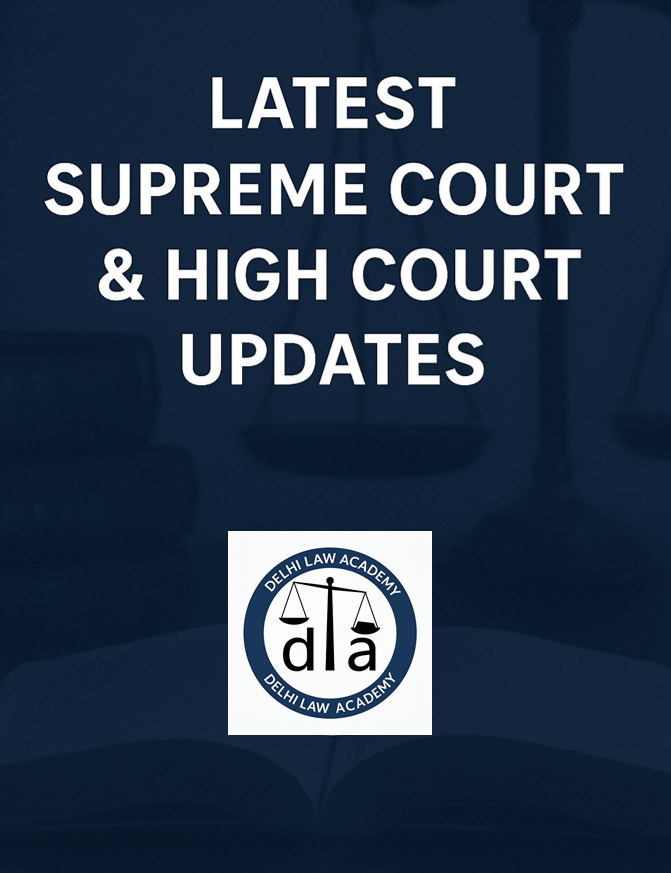
⚖️ Latest 2025 Supreme Court Judgment on Narco-Analysis Test
📢 Delhi Law Academy Jaipur presents below, for aspirants of RJS, DJS, PCS(J) and other Judicial Services across India, a summarized version of the latest Supreme Court Judgment in the case of Amlesh Kumar v. State of Bihar, delivered on 9 June 2025 by a two-judge Bench comprising Sanjay Karol and P.B. Varale JJ.
👨⚖️ Case Details
Amlesh Kumar v. State of Bihar
Judgment Highlights:
Appeal arises from the Patna High Court Order (9th Nov 2023)
Order had permitted Narco-analysis test of accused persons and witnesses during investigation
🧪 What is a Narco-Analysis Test?
An interrogation method where a suspect is injected with a psychoactive drug (commonly sodium pentothal)
Purpose: to suppress reasoning power and reduce ability to make conscious decisions
At higher dosage, the same drug is used for general anesthesia in surgeries
📚 Background – Constitutional Challenge
The constitutional validity of Narco-analysis (along with polygraph tests) was challenged in Selvi v. State of Karnataka (2010).
The Supreme Court (3-Judge Bench) held that involuntary administration of these tests violates:
Article 20(3): Right against self-incrimination
Article 21: Right to personal liberty and substantive due process
🔑 Principles from Selvi Case
Articles 20 & 21 are sacrosanct and cannot be diluted
Involuntary narco-analysis = violation of Article 20(3)
Results of such tests cannot be treated as material evidence
Lack of consent = violation of due process & personal liberty
Breach of privacy rights when conducted without consent
Voluntary tests allowed only with safeguards, but results cannot be directly admissible (only subsequent discoveries via Section 27, Indian Evidence Act)
⚖️ Findings in Amlesh Kumar v. State of Bihar
Involuntary Narco-analysis Tests
Completely impermissible under law
Reports or subsequent information not admissible as evidence
High Court’s Error
Acceptance of Investigating Officer’s proposal for Narco-analysis was in direct contravention of Selvi judgment
Violated Articles 20(3) and 21
Voluntary Narco-analysis Tests
Reports cannot be sole basis of conviction
Admissibility only if information is discovered subsequently (via Section 27)
Accused has no indefeasible right to demand such a test
Court must assess free consent, safeguards, and timing (preferably during trial when accused leads evidence)
📜 NHRC Guidelines (Selvi v. Karnataka, 2010)
The National Human Rights Commission (NHRC) guidelines must be strictly followed:
✅ No test without consent of accused
✅ Accused must have lawyer access & informed of implications
✅ Consent recorded before Judicial Magistrate
✅ Accused must be represented by lawyer during hearing
✅ Statements not treated as confession but only as police statement
✅ Magistrate must consider detention conditions & interrogation details
✅ Test must be conducted by an independent agency (e.g., hospital) in presence of a lawyer
✅ Full medical + factual narration must be recorded
🏛️ Final Order of the Supreme Court
The impugned Patna High Court Order permitting Narco-analysis was set aside
Reiterated that:
❌ Forced Narco-analysis is unconstitutional
✅ Voluntary Narco-analysis allowed only with safeguards & limited evidentiary value
📢 Call to Action
Want to master latest case laws & Supreme Court judgments for Judiciary Exams?
👉 Check out our:
Student Testimonials
Contact us
📍 Delhi Law Academy – Jaipur Branch
6C, Tower 2, Coaching Hub, Pratap Nagar, Jaipur – 302033
📞 Phone:
+91 9911916552,
+91 8447285606
✉️ Email:
contactus@delhilawacademy.com
🌐 Website:
www.delhilawacademy.com





